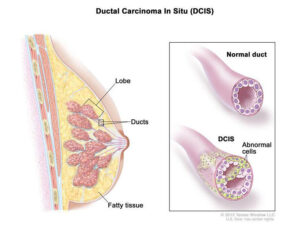The breast cancer in stage IV, also referred to as metastatic breast cancer, have spread from the breast and surrounding lymph nodes—the primary site of the cancer—to other organs like the brain, liver, lungs, or bones. It is not curable, but it can be managed. Most patients can live with an improved quality of life for several months or even years if they receive the proper care.
What is Metastatic Breast Cancer?
When breast cancer cells separate from the original tumor and move to other organs via the lymphatic or circulatory systems, this is known as metastatic breast cancer. Because the cells started in breast tissue, it is still referred to as breast cancer even though it has spread.
There are two primary ways it can be diagnosed:
- Distant recurrence: When previously treated breast cancer returns and spreads.
- De novo metastatic breast cancer: When the cancer is already metastatic at the time of the first diagnosis.
Types and Subtypes of Metastatic Breast Cancer
Metastatic breast cancer can originate from various types of breast tumors:
Common Types:
- Invasive Ductal Carcinoma (IDC) – Originates in milk ducts; most common.
- Invasive Lobular Carcinoma (ILC) – Begins in the lobules; second most common.
Subtypes Based on Receptor :
- Hormone Receptor-Positive (ER+/PR+): Tumors grow in response to estrogen or progesterone.
- HER2-Positive: These cancers grow quickly and contain high amounts of the HER2 protein.
- Triple-Negative Breast Cancer (TNBC): Aggressive and common in younger women. Lacks ER, PR, and HER2.
Note: Knowing the subtype is crucial, as it directly influences the treatment strategy.
What are Metastatic Breast Cancer Symptoms?
Depending on where the cancer has spread, symptoms can change:
- Bone Metastasis: Swelling, fractures, and bone pain
- Lung Metastasis: Dyspnoea and a chronic dry cough
- Liver Metastasis: nausea, itchy skin, jaundice, and abdominal pain
- Brain Metastasis: Headaches, seizures, confusion, vision problems, dizziness
Note: Changes in appetite, weight loss, and exhaustion are additional general symptoms. If your symptoms are persistent, always get medical advice.
Risk Factors for Metastatic Breast Cancer
While anyone can develop metastatic breast cancer, certain factors increase the risk:
- Aggressive cancer subtype (e.g., TNBC)
- Large tumour size or involvement of lymph nodes at the time of diagnosis
- Diagnosis at a later stage
- Some gene mutations (BRCA1/BRCA2, for example)
Note: Some patients may experience metastases even after receiving early treatment, and not all cases have observable risk factors.
How is Metastatic Breast Cancer Diagnosed?
A timely and precise diagnosis is essential for effective treatment. Your oncologist may recommend several tests based on your symptoms and medical history:
- Imaging tests include bone scans, CT scans, MRIs, PET-CT scans, and X-rays.
- Blood tests include liver/kidney function, tumor markers (CA 15-3, CA 27.29, and CEA), and complete blood count (CBC).
- ER, PR, and HER2 receptor status are checked, and the diagnosis is confirmed by biopsy.
- For targeted treatments, genomic and molecular testing finds mutations such as those in BRCA, PIK3CA, PD-L1, and MSI-H.
Treatment Options for Metastatic Breast Cancer
Although there is no cure for metastatic breast cancer, there are several treatments that can help restrict its spread and enhance quality of life.
- Hormonal therapy: Blocks hormones that encourage the growth of cancer in ER/PR-positive tumors.
- Chemotherapy: Effective against aggressive subtypes of cancer, it kills cancer cells all over the body.
- Targeted therapy, which includes HER2-targeted medications like trastuzumab, targets particular genes or proteins in cancer cells.
- Immunotherapy: In TNBC with PD-L1 expression, it is particularly effective at stimulating the body’s immune system to attack cancer cells.
- Radiation therapy: Aids in controlling tumors or reducing pain in particular regions, such as the brain or bones.
- Surgery: primarily to control symptoms or treat complications (such as painful tumors or blocked ducts).
- Palliative and Supportive Care: Focuses on symptom management, emotional support, and maintaining quality of life.
Average Survival Rates and Outlook
Survival depends on many factors:
- Tumor subtype
- Location and extent of metastasis
- Age and overall health
- Response to treatment
Women: The 5-year relative survival rate is around 30%
Men: The 5-year relative survival rate is around 19%.
Note: Advancements in therapies have significantly extended life expectancy for many patients.
Living with Metastatic Breast Cancer
Getting a stage IV diagnosis can be very stressful. Typical emotional reactions include sadness, fear, and future uncertainty. However, support is available:
- Join online communities or support groups.
- Closely collaborate with a multidisciplinary healthcare team
- Inquire about clinical trials for new treatment approaches.
- Maintain open communication with your doctor through shared decision-making
Final Words
Although the diagnosis of metastatic breast cancer can be difficult, it’s vital to understand that there are growing treatment options and that many patients are still able to live lives of fulfilment despite the illness. Early detection of symptoms, personalized treatment plans, and holistic care can make a significant difference.
FAQs
What is metastatic breast cancer?
This is stage IV breast cancer that has metastasised to the brain, liver, lungs, or bones.
What are the common symptoms of metastatic breast cancer?
Depending on where it spreads, symptoms may include headaches, fatigue, jaundice, coughing, bone pain, and weight loss.
How is metastatic breast cancer diagnosed?
through blood tests, biopsy, and scans (MRI, PET-CT) to determine genetic and receptor status.
What are the treatment options?
Some of the best treatments include radiation, immunotherapy, targeted medications, hormone therapy, chemotherapy, and supportive care.
What is the survival rate for metastatic breast cancer?
Depending on the type of cancer and the treatment received, approximately 30% of women and 19% of men over five years.








